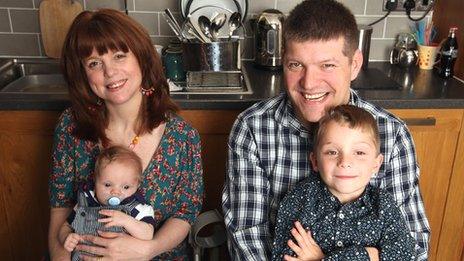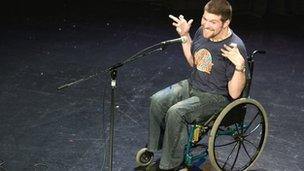Viewpoint: What's it like to be a disabled dad?
- Published

Laurence Clark is a stand-up comedian who has cerebral palsy. He lives with his wife Adele and his two sons Tom, seven, and Jamie, nine months. Here he describes both the challenges and the attitudes people have towards families like his.
I guess my family does not fit with the typical image of 2.4 children. But wouldn't it be boring if all families were identical?
One bizarre reaction I often get is people thinking that I'm somehow depriving my children of physical activity because their dad is a wheelchair user.
I typically get comments like: "Isn't it a shame the boys will never get to play football with their dad?"
But there are lots of other different types of play which are accessible that I can do with the boys, such as reading, jigsaws or going to the cinema, and if they desperately wanted to play football then they have a footie-obsessed granddad who is more than happy to oblige. And we do live in Liverpool after all.
Over the years I've also found there seems to be this general misunderstanding that disabled people have kids in order to provide them with a free source of "care" or support.
Whenever issues around disabled parents make it into the media, it's typically around the lack of support for young carers. Indeed sometimes I can't help but feel that society seems more comfortable with the notion of my children looking after me - rather than supporting me to look after my children.
Of course, no child should be put in a position where they are being relied upon by their parents for basic day-to-day support. One thing about my family which surprises people is that we manage our own support and don't expect our kids to "look after" us.
We have a personal budget from our local authority which we use to employ personal assistants to support us with day-to-day living, including our roles as parents. This can involve helping us do tasks like getting our kids to nursery or school in the mornings, washing their clothes and preparing meals.
However more and more government cuts to local authority funding are, in turn, having a huge effect on local social care provision for people like us. Only this week Chancellor George Osborne announced in the Budget a further £10bn cut in welfare spending in 2016-17 from the forecast bill.
To me, giving disabled parents adequate support makes good sense, as the knock-on effect is fewer children being placed in the position of having to provide support for their parents. Instead disabled parents would be able to fulfil their roles as parents, thus freeing their children to get on with simply being kids.
There's also a misconception that disabled people with my degree of impairment are incapable of being parents at all.
When we'd tell people we were expecting we'd get one of two reactions. They either assumed we must have had IVF because we couldn't possibly have done it the old-fashioned way. Or they would shake my hand firmly and say "Congratulations" while I could see them thinking: "How the hell did he manage that then?"
It is often said that a defining point in any child's development is the moment when they realise they are better than their parents at doing a particular thing.
To the best of my knowledge, this moment arrived for my older son Tom on his fifth birthday when he asked me to help him play a game on his new games console. It was then I discovered that most video games are not really designed for the co-ordination skills of someone with cerebral palsy.
Of course, another common reaction I get when I tell people that I'm a dad is that I'm apparently "inspirational". These sorts of reactions really get on my nerves as they assume that I'm some sort of special case, when in fact there are thousands upon thousands of disabled people who choose to take the parenting plunge.
That said, as a child I can't remember ever seeing any adults with cerebral palsy who had become parents. This in turn had a knock-on effect on expectations for my later life, since if you are not used to seeing people like yourself taking on responsibility and living full lives then it becomes harder to envisage yourself doing these sorts of things in the future.

Laurence Clark encounters curious attitudes
It was only as an adult that I finally met some disabled parents and realised this was not some impossible dream.
I guess Adele and I didn't decide to have children to have them "look after" us or to prove a point, but for probably the exact same reasons as everyone else who decides to start a family.
My kids are used to having a dad who uses a wheelchair because they've never known any different. It's only when other people comment or make an issue of it that it ever becomes a problem for us.